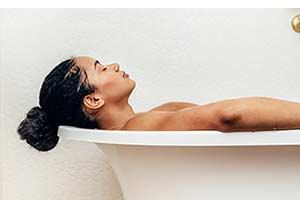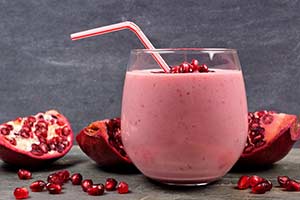Coping With Stress
How stress affects our health & well-being and ways to minimize its effects
In times of stress, our bodies react with a defense mechanism, stimulating the "fight or flight" reaction resulting in increases in cortisol and other hormones. Prolonged stress can reduce our body’s ability to bounce back from it. As a board-certified obstetrician and gynecologist and nationally recognized expert in hormonal wellness, Rebecca Booth, M.D. is actively helping her patients navigate the stress resulting from the uncertainty, anxiety, social isolation, economic impact and the upended routines we are all facing. While each of our circumstance is unique, as is our body, a common denominator is stress affects our hormonal balance. Understanding the impact and finding ways to address stress will be key to our physical and mental recovery.
Below, Dr. Booth shares her insights and her recommendations for how to deal with stress:
Stress: Cortisol & Adrenal Glands
Cortisol is one of the steroid hormones and is made in the adrenal glands. In addition to its well-known role in "fight or flight" activation, normal cortisol levels protect our overall health and well-being by helping regulate blood sugar levels, metabolism, inflammation, memory formation, blood pressure and salt and water balance. However, prolonged cortisol elevation triggered by stress can have negative cascading effects throughout our body including suppressed immune system, osteoporosis, heart disease, depression, headaches, memory and concentration problems, digestion issues, trouble sleeping and weight gain. And because "it's all connected" when it comes to our body, a disturbance in one area can cause and accelerate problems in other areas of our body.
Cortisol, The Immune System and Stress
Adrenal Glands and Stress
Stress and our Reproductive Hormones
Mother Nature designs estrogen and progesterone in a complementary way with regard to the immune system. Estrogen tends to enhance our immune system, while progesterone tends to suppress it. During times of chronic stress studies have shown that all of the reproductive hormones: estrogen, testosterone, and progesterone decrease, impacting the immune system in a negative way, and sometimes pausing fertility. This is self-corrected when stress reduction techniques are employed effectively, or the source of the stress is resolved.
Stress and Skin Effects
Stress, especially prolonged, has a significant impact on the quality of the skin. Increased cortisol can alter carbohydrate metabolism and set up for changes in skin such as flares of rosacea and breakouts. Bursts of stress can cause adrenaline release resulting in flushing of the face and neck. Long term stress can increase the chances of broken capillaries and ruddiness. For women, Mother Nature knows that high levels of stress indicate that it’s not an opportune time for pregnancy. As a result, extreme or chronic stress may cause a pause in ovulation, altering hormonal balance. Stress-induced irregular ovulation can result in blemish due to a drop in estrogen relative to testosterone. These negative effects are reversed with effective stress reduction techniques, or when the source of the stress is resolved. Given that we are in a climate where avoiding stress is difficult, it is more important than ever to increase tactics to reduce stress and the effects of stress.
Strategies to Reduce Stress
There are many tools to help alleviate the effects of stress and these techniques are also good for overall health. In these unprecedented times it is crucial to incorporate as many of these well being steps as your day allows.
Knowledge is Power
The first step in taking charge of a stressful situation is to gather factual, reliable information. Clear and trustworthy information can lessen fear and help dampen adrenaline and cortisol surges.
Exercise
Exercise 20 to 60 minutes a day, preferably a combination of spine strengthening exercises such as yoga or Pilates and cardio training. Exercise improves the immune system, normalizes stress hormones, and helps sustain the adrenal glands.
If you're like many of us and find yourself binge watching movies or TV shows during quarantine, our Customer Care team member Eileen has adopted a policy of staying active while enjoying some entertaining content- she streams movies or shows in the kitchen while prepping healthy meals or exercises and stretches on the floor while watching at other times. We approve of this policy and wanted to pass it on!
Meditate
Focused meditation is an excellent way to dampen an overzealous fight-or-flight reaction. Even visualization techniques, such as visualizing how best to handle a specific situation, can be strategic.
Personally, I meditate each morning and incorporate a visualization technique before leaving my bed. I lie still with hands placed gently to my sides and imagine my day from the time my feet hit the floor. I consciously focus on my breath, breathing deeply and visualize the ideal day going through my tasks and routine for that particular day. It takes about 8-10 minutes and has made a positive impact on starting the day with the right mindset.
Take Supplements
Supplements such as additional vitamin C (100 to 500 mg), Omega-3 oil (1000 to 2000 mg) for mood support, vitamin D (1000-2000 IU a day) to optimize metabolism, mood and immunity, and for prolonged stress consider supplementing with DHEA (5 to 25 mg).
Healthy Nutrition
Our self-care remains of vital importance including balanced nutrition with a focus on fruits and vegetables that have high natural vitamins, as well as easily digestible protein sources such as those from plant protein including nuts and nut butters, seeds, lentils, and legumes. And for the omnivore, animal sources such as organic bone broth.
Sleep
Lack of restful sleep not only ages our appearance, but directly contributes to increased stress levels that can disrupt hormonal balance. Make sleep a priority and seek help if you have insomnia. Try for a minimum of seven hours and consider a fitness tracker to determine if you are experiencing disrupted sleep. There are a number of techniques and herbal supplements that can help with good quality sleep, but the first step is to make a conscious effort to clock it in. And remember, protein rich foods help with sleep, so a plant protein rich snack, such as almond butter with a warm cup of chamomile tea before bedtime is a great way to help achieve sleep.
Personal Care
Self-care includes caring for skin and hair, especially in times of stress when skin can react and show the signs through loss of glow, tone and the appearance of breakouts. Taking the time to lean into your personal care regimen will be an opportunity to reduce stress and care for your skin, scalp and hair.
We created the VENeffect Skin Care line with a mind toward inspiring skin to peak vitality. The phytoestrogens that power our unique technology are plant-based mimics of estrogen that safely and effectively increase production of collagen, elastin and hyaluronic acid. In times of reduced hormonal reserves, bringing back resiliency in skin is a welcome and needed relief.
About Rebecca Booth M.D.:
Rebecca Booth, M.D. is a board-certified obstetrician and gynecologist who has been practicing medicine for over 30 years and is co-managing partner in one of the largest OB/GYN practices in the southeast of the United States, Women First of Louisville. She is a nationally recognized expert in hormonal wellness and author of The Venus Week: Discover the Powerful Secret of Your Cycle…At Any Age. She, together with her sister Cecil Booth, founded an anti-aging skin care line, VENeffect, with a breakthrough phytoestrogen technology to replenish lost elasticity and luminosity. She has appeared on The Today Show and been extensively featured in leading women’s magazines including O: The Oprah Magazine, Good Housekeeping, Redbook, Glamour Shape, Prevention, and Self. She has been published in leading medical journals. Dr. Booth earned her medical degree from the University of Louisville School of Medicine. She resides in Louisville, Kentucky.



